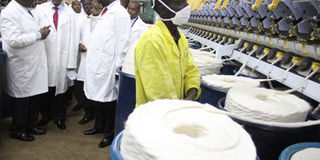Cotton farmers to get a boost

From left: Rivatex East Africa managing director David Tuigong, Industrialisation CS Adan Mohamed and Uasin Gishu Governor Jackson Mandago during a visit to the factory in April this year. PHOTO | FILE |
What you need to know:
- Farmers have been given free seeds
- Textile firms and the chamber will join hands with local and foreign universities to improve farmers’ cotton growing skills using drip irrigation, and restart collapsed ginneries.
The fortunes of cotton farmers will be getting a boost from textile firms and the Kenya National Chamber of Commerce and Industry.
Textile firms and the chamber will join hands with local and foreign universities to improve farmers’ cotton growing skills using drip irrigation, and restart collapsed ginneries.
The farmers will also get free certified cotton seeds from the government.
“Lack of appropriate production technologies, disease and pests, and limited credit for land preparation and procurement of inputs are some of the challenges to be tackled,” said Mr Laban Onditi, the chamber’s national vice chair.
Experts from Jomo Kenya University of Agriculture and Technology and the Botanic University of China will be involved.
Rivatex East Africa Limited, owned by Moi University, has acquired 50,000 acres of land in Mwingi, and another 1,000 and 100 in Kerio Valley and Mogotio to grow cotton.
Moi University Vice Chancellor Prof Richard Mibey said the company was producing an average of 10,000 meters of fabrics daily up from 2,000 when it took over management after it was placed under receivership due to administrative and financial mishandling.
“It is unfortunate that the Agoa (African Growth and Opportunity Act) market has not been exploited by motivating farmers to increase cotton production to create an economic revolution and improve farmers’ living conditions, said Mr Onditi, who is also a director with the Export Processing Zone Authority.
Farmers claim the only ginnery in the region-Salawa lacks sufficient funds to purchase the produce.
“Cotton has been undergoing a recovery after many years of collapse,” said Jackson Chelanga from Salawa.
Country imports 9,600 bales
Cotton production in the country increased from 30,000 bales in 2010 to 40,000 bales in 2011 but the output is set to rise due to increased demand for the produce by textile manufacturing companies.
According to an annual agriculture report released in May, Rift Valley province produced an average of 852.60 tonnes from 794.5 hectares of under cultivation of the crop last season.
The country imports about 9600 bales of cotton monthly from Tanzania and Uganda to bridge the deficit of raw materials for local textile factories.





